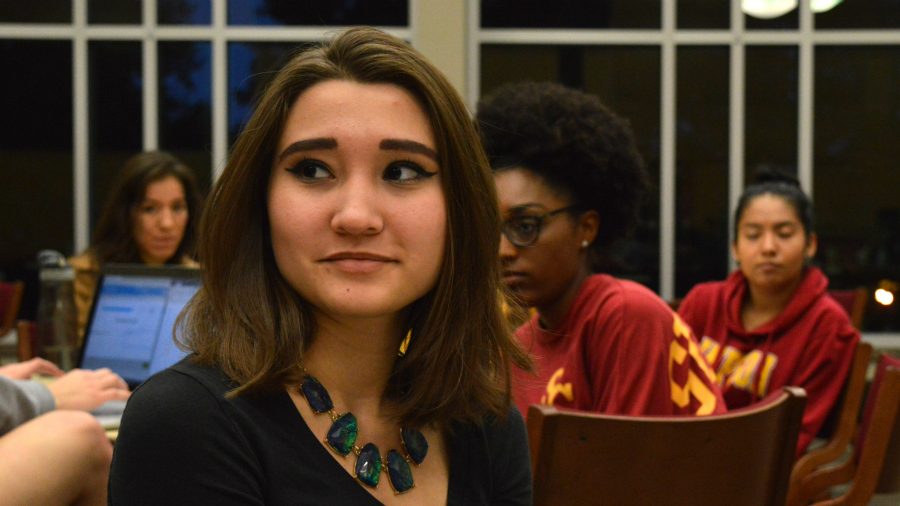Community forum tackles issues of violence, race
Students were placed into small groups and encouraged to discuss their experiences of oppression or discrimination at a community forum on Monday, Oct. 10, 2016. (Lucy DeBisschop/The Simpsonian)
October 14, 2016
Simpson College staff, faculty and students attended an open forum earlier this week to discuss issues of violence, police shootings and race.
The event was held to encourage dialogue and reflection by bringing people together to share their personal stories and create a community of change.
Heidi Levine, vice president of student development and planning, had the idea to organize the forum after seeing news of police shootings in the media. She saw many campuses responding to the issues, with students organizing protests and campus gathering, but was surprised to see many Simpson students were silent.
“There has to be a clear sense of what is happening affects us, and I realized I wasn’t hearing that kind of outcry from our students,” she said. “I think that, for a lot of our students, these incidents feel very removed – and they shouldn’t.”
She decided to reach out to Walter Lain, assistant dean of multicultural and international affairs, and Mara Bailey, chaplain. Together, they decided to organize The Community Forum Event.
Lain, along with Carolyn Dallinger, department chair of sociology and criminal justice, led the discussion.
“We have all heard in the news the issues of violence, police shootings and race. It seems to be a piece of national dialogue, but one thing that is missing from the dialogue is actual discussion and reflection,” Lain said.
At the beginning of the forum, Lain explained ground rules for the discussion, which included: Listen to each other with a tone of respect, allow each person to talk one at a time, speak for yourself and not as a representative of a group, use your own experiences and not the stories of someone else, and do not be afraid to let someone know if something they say is hurtful.
Lain explained these rules were intended to create a safe space where participants could feel comfortable sharing their experiences and also learn from others.
Students were numbered off and asked to sit at respective tables. They then were encouraged to each share a personal story where they have experienced any form of oppression or discrimination during their lifetime.
After sharing with the small groups, the room opened to discussion. Any terms that were brought up during the conversation were defined on a writing pad at the front of the room.
One person in attendance was Simpson President Jay Simmons. He said he was deeply grateful for the opportunity to hear students speak about their experiences and hopes to use that knowledge to create a safer campus.
“It broke my heart,” he said. “I heard students share stories about what has happened to them, and it gave me a lot of pain. No one should have to experience those things.”
He also shared his own experiences growing up. Simmons said he was born when Jim Crow laws, the practice of segregating black people in the United States, were still legal.
He was a toddler when The Civil Rights Act was passed, making them illegal. He also described the atmosphere when George Wallace, an American politician known for his segregationist attitudes during the Civil Rights Movement, gained national prominence and ran as a presidential candidate.
“I saw the vitriol and the bigotry that came with that. I thought that was behind us, and that was naïve on my part,” he said. “I know we had problems, but I thought the worst of it was behind us.”
Simmons said the current atmosphere scares him, and he hopes to sessions like the forum will help educate the community on what other people are experiencing.
“We need to do this more, and we need to have these conversations to help us progress as a community,” Simmons said. “I am grateful to Heidi Levine, Walter Lain and Carolyn Dallinger for doing this, and I hope more members of our community will participate next time.
At the end of the discussion, Simmons also addressed the group and encouraged them to share their stories with the Diversity and Inclusion Committee to meet with each other again and to continue to educate themselves on the issues.
“I want those terms that we have discussed here to become academic – terms that used to describe a situation that no longer exists,” he said.
Levine said the forum was a success, and she hopes students benefited from the discussion.
“It was really powerful for me, and I assume it was for other people to hear that there are people in this community who live with these issues, who have been stopped for questionable reasons and who have to fear for themselves and their family members,” she said. “I hope it brought the issues closer to home.”






